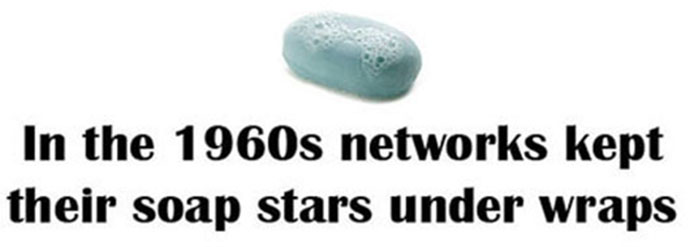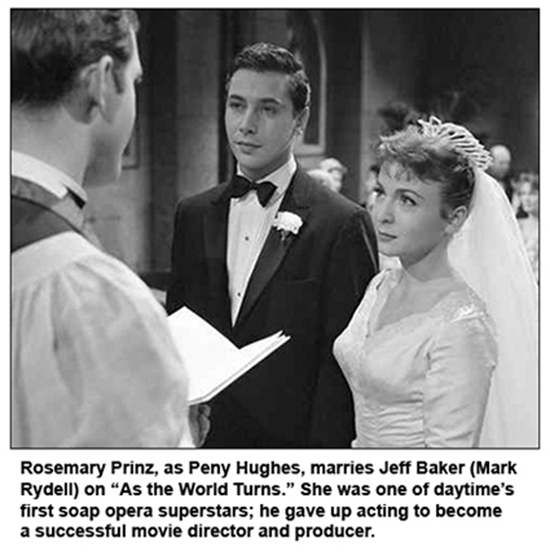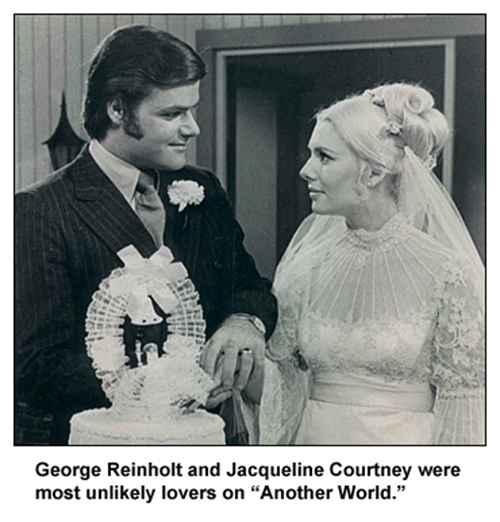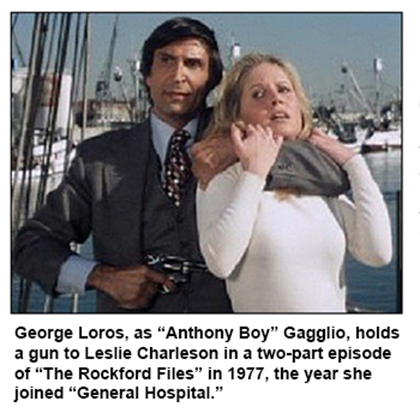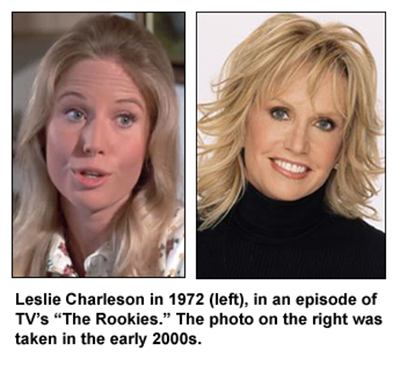However, in the early ‘60s, a few daytime performers did emerge as stars. I interviewed one such star, but only because her character on “As the World Turns” had been sent on one of those convenient trips that allow actors to take vacations. Rosemary Prinz, who played Penny Hughes from 1956-68, used her vacation to perform in summer stock. Among her stops in 1962: a theater in Canal Fulton, Ohio. That’s where we met after the theater set up an interview.
The clipping from that interview has disappeared. I pretty much faked my way through our meeting because I didn’t watch Prinz's program. I had seen an episode or two during visits to my parents in Solvay, N.Y., so I called my mother for a quick recap of recent events in fictitious Oakdale and for suggestions about questions to ask. The questions must have been good because the interview went well, though nothing memorable was said.
I CAN'T THINK of Canal Fulton without recalling one of its resident actors from the early 1960s: George Reinholt, who later went to New York and became a soap opera star playing Steven Frame on “Another World” opposite Jacqueline Courtney from 1968-75. When they were fired from that show, they moved to “One Life to Live," playing new characters for two years
Reinholt was an uneven stage performer, to say the least. I had no idea if he was homosexual (as we used to say), though he remained a bachelor all his life. In 1997 he put an advertisement in a New York newspaper offering his services as an escort for women, most likely older, wealthy women who didn’t want to go to a party or the theater alone. I’m sure Reinholt was telling the truth when he denied stories that suggested he was selling sexual favors. Reinholt acted on stage as though the only person he was attracted to was the one who stared back at him in a mirror.
Yet he was very popular for awhile as a daytime leading man, which astounded me because he flounced around the Canal Fulton stage like a drama queen. One reason given for his dismissal from “Another World” was that he behaved like a diva. I believe it.
As for his on-camera love interest, Courtney had a real-life husband during most of the years she worked with Reinholt. Neither had a career outside of the daytime soaps. She died in 2010, he died in 2013.
I had no interest in interviewing Reinholt at Canal Fulton. Frankly, I didn’t think his acting career would lead anywhere. The one performer from that theater who did seem headed for bigger things was a young character actor named Eldon Quick, who went to California in the mid-’60s and found work in several prime time television series, including "M*A*S*H," though his last credit, in 1986, was for a few episodes of “The Young and the Restless.”
ONE OF THE FEW interviews set up to promote a daytime soap was with actor Dana Andrews in 1969. I had talked to him years earlier about his move from the big screen to the small, and his hopes for a weekly series (which didn’t pan out). The second interview was in connection with an NBC soap opera called “Bright Promise,” which ran about two years.
It was during this period that some fairly well-known movie stars moved into daytime drama. Macdonald Carey (“Days of Our Lives”) was one, Joan Bennett (“Dark Shadows”) was another. Years later Richard Egan headed the cast of “Capitol.”
Even prime time soaps didn’t generate many interviews, at least not for writers at mid-size and small newspapers. The most popular prime time soap in the 1960s was “Peyton Place.” I would have jumped at the chance to interview Mia Farrow or Barbara Parkins, but the offer was never made.
In 1970 I interviewed Robert Foxworth in connection with a short-lived prime time series originally called “Storefront Lawyers” (later changed to “Men at Law”). There was no Foxworth interview offered in 1981 when he starred with Jane Wyman in “Falcon Crest,” which became a big hit.
I HAD NO opportunity to interview any of the regulars on "Dallas" or "Knots Landing," which was one of my favorite shows, though just before "Knots" went off the air, I did have a phone interview with the man who started it all — David Jacobs, who created "Knots Landing, but couldn't sell it to CBS until he gave birth to "Dallas." Then, when "Dallas" earned a spot on the CBS line-up, the network told Jacobs to re-work "Knots Landing" by bringing one of the Ewing brothers into the show. That was Gary Ewing, the "Dallas" black sheep.
Jacobs and I did not have an amicable conversation. I asked a question he had heard too many times in the past: Had he based "Knots Landing" on the 1957 film, "No Down Payment," which also was about four couples in suburbia.
He claimed he had never heard of the film before he wrote his pilot script for "Knots Landing," which, he admitted, was poorly named. Jacobs was born in Maryland and did his early work in New York City. Perhaps thinking of such places as Tracys Landing, Md., or Glenwood Landing, N. Y., he came up with the name for his television show, with "Knots" taken from the marriage expression, "tying the knot." He told me he was unaware that towns with "Landing" as part of their name was pretty much a Northeast thing; there are none on the West Coast where his series was set.
He claimed he'd set out to do an Americanized version of Ingmar Bergman's "Scenes from a Marriage," and while he disputed this, I thought he simply improved on "No Down Payment." The key couple in the first season of "Knots Landing" was Sid and Karen Fairgate, who were nearly duplicates of Herman and Betty Kreitzer of "No Down Payment." Especially similar were the actresses who played the roles — Michele Lee on "Knots," Barbara Rush in "Payment." (Their husbands were played by Don Murray and Pat Hingle.)
He did admit I was far from the first person to mention "No Down Payment," though he'd hoped the subject had been put to rest. He also admitted a writer friend of his gave him a copy of the 1957 film and suggested it was a good idea to watch it before "Knots Landing" went on the air.
Another sore point with Jacobs was "Dallas." He stressed he had nothing to do with the show past the pilot film. As you might expect, Gary and Valene Ewing were his least favorite couple on "Knots Landing" because of their connection with "Dallas." Jacobs was able to cut "Knots" loose from "Dallas" when the Texas-based soap opera killed off Bobby Ewing at the end of the 1983-84 season. When Bobby came back to life on "Dallas" in the fall of 1985 — it was just a dream, remember? — he remained dead on "Knots Landing" where his name was seldom, if ever, mentioned in the years that followed.
What surprised me was how annoyed Jacobs seemed when, in my best facetious tone, I asked if there were a kind of Lorimar Repertory Company, since several actors turned up on at least two of the three Lorimar soap operas ("Falcon Crest" was the other). At various times, Laurence Haddon, Ray Wise, Barry Jenner, Jonathan Goldsmith, Howard Duff, Alan Miller, and other actors played fairly important roles on both "Dallas" and "Knots Landing." Jacobs denied noticing this, and our conversation petered out soon thereafter. I don't think he ever forgave me for asking about "No Down Payment."
FORGOTTEN, until I combed through my clippings, was a 1970 phone interview that was a big deal in my family at the time. On the other end of the line was Leslie Charleson, a star of my first wife Karla's favorite daytime soap opera, "Love Is a Many-Splendored Thing." Karla and I were unaware at the time of the interview that Charleson's days on the program were numbered, and if the actress knew about it, she kept it to herself.
The network didn't initiate the interview; I did. The network also didn't supply photos, which should have been an indication Charleson would soon be leaving the series, which continued for three years after she left. Her character, Iris Donnelly Garrison, was taken over by Bibi Besch. Iris' sister, Laura, was originally played by Donna Mills, who also left the series in 1970 and would have better luck in prime time, especially after she joined "Knots Landing" in 1980. Her place on "Love Is a Many -Splendored Thing" was taken by Veleka Gray.
Charleson was up front about the show and her character, who had gone blind during pregnancy. She gave birth, but nearly died, gamely fighting for life through several episodes and later, thanks to a new laser surgery technique, her sight was restored.
Far-fetched? Maybe, said Charleson, but "While I was preparing to act blind I talked to a girl who had lost her sight for about two years. She's all right now."
However, she admitted that occasionally her problems got out of hand.
"A few weeks before the baby arrived Iris convinced her husband (Spence) to let her sister adopt it. None of us thought this was a good idea and we argued with the writers, but we had to do it anyway."
Charleson, who was 25 years old when the interview took place, was born in Kansas City, but grew up in Darien, Connecticut. She became interested in acting while attending Bennett Junior College in Millbrook, New York. She moved to New York City when she was 20 and quickly landed a role in an ABC soap opera, "A Time For Us" (now referred to as "A Flame in the Wind"), but that lasted only a year. Among her co-stars was Richard Thomas. Charleson went from that show into "Many-Splendored Thing."
She received a lot of fan mail and said that the letters had changed noticeably over the four years she had been doing soap operas. "Half the people who write do so just to say they enjoy the show or my performance. When I went blind, some people wrote to say it was obvious I was leaving the show and they wanted to wish me luck.
"We seldom get those little bits of advice about the things that are going on behind our backs. Few people confuse me with my character anymore."
I asked if she wanted to go on stage. "Naturally I'd like to do something on Broadway, but I'm just as likely to do another television series when Iris finally does leave the show."
How about musical theater? That brought a laugh. "I took singing lessons just long enough to realize it's a hopeless cause. If I ever get a role in a musical it'll have to be for someone who's not supposed to sing very well."
Leslie was single at the time — and would remain that way until 1988 when she began a three-year marriage to Bill Demms — but what people wanted to know in 1970 was whether she was dating Ed Power, who played her husband on the show.
"No, but I do go out with David Birney, who plays Mark, my brother in law."
Mark was one of the program's villains.
"I don't know if you should print that I date David. Some of the people who watch the show may be mad when they read it."
WHEN SHE left "Love is a Many-Splendored Thing" she spent seven years working mostly in guest roles on prime time TV shows. She did appear in a small role in a 1968 Kirk Douglas movie, "A Lovely Way to Die," which introduced Ali MacGraw to the big screen, also in a small role.
It was in 1977 that she joined "General Hospital" in the role of Monica Quartermaine." She still appears in the show, but is no longer under contract.
It also was in 1977 that she was featured in a two-part episode of "The Rockford Files" as a woman being hunted for what she knew as a result of dating a mob lawyer. This was one of "Rockford's" best episodes because of the performances of the actors playing the two New York mobsters who were on her trail, George Loros as "Anthony Boy" Gagglio and Luke Andreas as Syl. Both would return two years later when "Anthony Boy" tried to get even with private eye Jim Rockford (James Garner).

